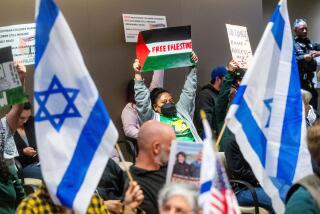House vote on sex slavery cheered
- Share via
For Korean American activists, Monday’s passage of a House resolution -- calling on Japan to formally apologize for its wartime coercion of women and girls into sexual slavery -- represents not only an important victory but a lesson in grass-roots politics.
“We now have confidence in talking to mainstream politicians,” Koreatown attorney Daniel Lee, coordinator of the 121 Coalition, said at a news conference Tuesday. The group took its name from the resolution.
Lee and other activists had gone to Washington with former sex slave Yong-Soo Lee to witness the unanimous House approval of the measure, which had been the focus of a months-long campaign by human rights groups.
“We found out for ourselves that American politicians are sensitive to what their constituents say,” said Lee, a Huntington Beach resident. Working with volunteers from churches, community groups and the PTA, his group gathered thousands of signatures and bombarded lawmakers with phone calls, letters and visits to get the measure enacted. They also experienced the satisfaction of joining forces with other ethnic groups, such as Chinese and Filipinos, as well as mainstream organizations, including Amnesty International and the Los Angeles branch of the National Organization for Women, he said.
A Japanese government spokesman called the passage of the resolution disappointing. Chief Cabinet Secretary Yasuhisa Shiozaki added in a statement, “We will need to continue to explain our stance on this issue to the United States.”
Introduced by Rep. Mike Honda (D-San Jose), HR 121 calls on Japan to formally apologize and unequivocally accept responsibility for the Imperial Armed Forces’ coercion of young women and girls into sexual slavery during World War II. It also calls on the Japanese government to pay reparations. Though the resolution is not binding, supporters say such a stand carries a powerful message not only to Japan, but to the rest of the world.
Researchers say more than 200,000 girls and young women from Korea, Taiwan, China, Japan, the Philippines and parts of Southeast Asia were conscripted by the Japanese military to serve the Japanese troops from the 1930s to 1945. They were euphemistically called “comfort women” and worked in “comfort stations” established throughout Asia.
In an effort to persuade lawmakers, amid heavy lobbying by Japan, members of the 121 Coalition, composed of more than 200 organizations, had invited former sex slaves to testify before a congressional committee.
Yong-Soo Lee has visited from South Korea three times since February to participate in many activities, including a protest against the Japanese prime minister during his visit to the nation’s capital and to address religious and community groups in Los Angeles, San Francisco, New York and Washington.
Lee, who at 78 is among the youngest comfort women still living, said she wanted to share the “victory” with the victims who are no longer living.
A big celebration and a farewell party for Lee, who will be returning to South Korea, is scheduled for Friday evening in Koreatown.
Jonghwa Lee, an assistant professor of communication studies at Loyola Marymount University, said the next step is translating the spirit of the resolution into reality.
One tangible expression of that goal will be a global conference on the Japanese sexual slavery, scheduled for Oct. 3-7 at UCLA, the scholar said.
Jonghwa Lee said experts from 11 nations and former comfort women will participate. Through the conference, he said, advocates want to examine the “actual legal basis of demanding from the government of Japan legal reparations.”
More to Read
Sign up for Essential California
The most important California stories and recommendations in your inbox every morning.
You may occasionally receive promotional content from the Los Angeles Times.













